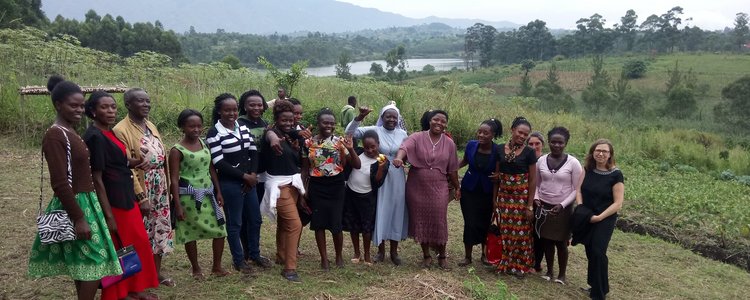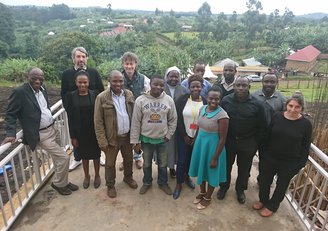On 5th of February 2020 Prof. Edward Rugumayo, the Chancellor of MMU officially launched the MSc programme in Agroecology highlighting the importance of it for MMU as a community-oriented university and the Rwenzori region. The launch ceremony was attended by over 100 community members, MMU staff and prospective students and was broadcasted live via MMU radio station.
The MSc programme is the first of its type in Uganda as the curriculum development followed a consultative process involving a wide range of regional stakeholders to address societal challenges using the most locally available and suitable solutions to meet the needs and demands of the local communities. The programme integrates skills and knowledge development in systems thinking and transdisciplinary approaches for co-creating and designing these locally suitable solutions for optimising productivity of (mainly small-scaled) farming systems in an agroecological manner.
The vision of the MMU is “being a centre of excellence in teaching, research and community engagement”. Elke Stinnig said “I am very pleased that our APPEAR project and the new master programme will contribute to this vision.” She stressed that this vision can only become reality if everybody takes on the spirit of the project.
Prof. Rugumayo, remembered the good old days when the Rwenzori mountain ranges were covered by ice caps that reinforced the beauty of the region. “Due to climate change, exacerbated by unsustainable farming practices, the glory of the region is slowly slipping away! I am therefore pleased that agroecology caters for both the household needs as well as the environmental needs” Prof Rugumayo said.
Violet Kisakye, the MMU project coordinator was pleased that the development of the curriculum was done through extensive stakeholder consultations. “What makes this programme special is the recognition that farmers are not mere recipients of innovations but are rather an integral part of innovation development” Violet emphasised.
On the same day the agroecological demonstration farm at MMU´s experimental side was officially opened by Elke Stinnig from OeAD-APPEAR Office, Vienna. The agroecological demonstration farm serves as an agroecological innovation hub for MMU staff, students and external stakeholders to enable practical trials on locally adapted solutions for the farming systems and to serve as an outreach centre for the local community.
To commemorate this remarkable day of the successful launch of the MSc in Agroecology and the opening of the agroecological demonstration farm, Prof. Edward Rugumayo, Prof. Bernhard Freyer, Elke Stinnig and more than 20 students were invited to plant trees at MMU´s experimental site.
Within the two staff members of MMU pursue their PhD at the University of Natural Resources and Life Sciences, Vienna (BOKU). Mary Ekyaligonza and Thaddeo Tibasiima are conducting their doctoral field research in the Rwenzori region and they are also involved in a broad range of project activities: Thaddeo Tibasiima made a presentation during the event and acted as master of ceremony and translated the speeches in local languages for the farmers who were present and for the listeners of the radio broadcast. Mary Ekyaligonza had the responsibility to organise the opening ceremony of the farm including the tree planting. For them as future lecturers within the programme the MSc really matters, as it includes the small scaled farmers´ perspectives to be dealt with in academia. Mary and Thaddeo conclude: “This is a motivation for the youth to participate in farming that sustainably utilizes the divers natural systems hence creating meaningful employment.”

